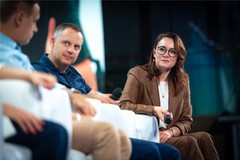Decisions on the path to EU integration should meet the interests of domestic business and the development of Ukraine’s economy: Yuliia Svyrydenko

As we move towards integration with the EU, we need to make decisions that meet the interests of domestic business and the development of the Ukrainian economy. This was stated by Yuliia Svyrydenko, First Deputy Prime Minister and Minister of Economy of Ukraine, in her speech at the discussion panel “Ukraine as a part of the EU internal market” as part of the conference on assessing Ukraine’s readiness to join the EU, which took place in Kyiv on 17 August.
“As a candidate country for EU membership, Ukraine has no other model for economic development than to comply with EU requirements and rules. But at the same time, EU norms are the norms for developed economies. So our goal is to develop faster. And this requires extraordinary solutions that do not always fit into the norms of directives and regulations,” said Yuliia Svyrydenko.
According to the First Deputy Prime Minister, qualitative changes are taking place today in economic relations between Ukraine and the EU, as well as in integration into the EU’s internal market. And this is much more than new legal agreements with the EU.
“Trade is a good example. For two years now, we have been exporting all our products to the EU without any duties. This is based on the EU’s unilateral decision. Our task now is to turn this temporary regime into a permanent one. If we manage to reach an agreement with Poland on the lifting of trade restrictions, we will start negotiations on amendments to the Association Agreement in the autumn in order to completely and permanently eliminate tariffs,” said Yuliia Svyrydenko.
She also noted that the EU had become the main trade route for Ukrainian goods to the world. In the first six months of 2023, the turnover of goods amounted to USD 27.6 billion. Compared to the same period last year, it increased by almost 12%, or USD 2.9 billion. A significant part of these exports is re-exported to third countries through EU ports.
The First Deputy Prime Minister also recalled that Ukraine continued to work on concluding an agreement in the field of technical regulation – an industrial visa-free regime – which would facilitate the export of more industrial products to the EU market. All EU assessment missions on this agreement were completed in July and the Government is now working on implementing the recommendations, after which the agreement will be signed.
In the area of customs integration, work is underway to expand the EUR.1 certification area. Currently, Ukrainian companies can use parts and raw materials from 36 European and Mediterranean countries to manufacture products that can be imported duty-free into the EU. Moldova and North Macedonia have recently joined these countries. Montenegro and Turkey are next. Integration into the NCTS system will gradually streamline transit through the EU.
IC UAC according to the MEU
- 688 reads





